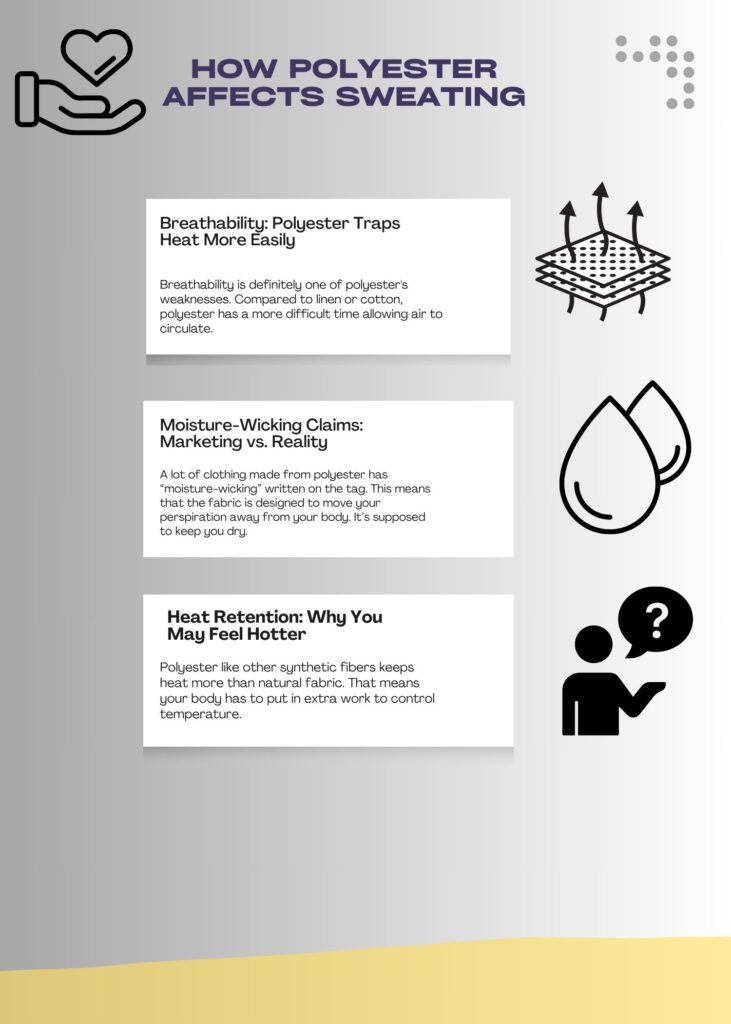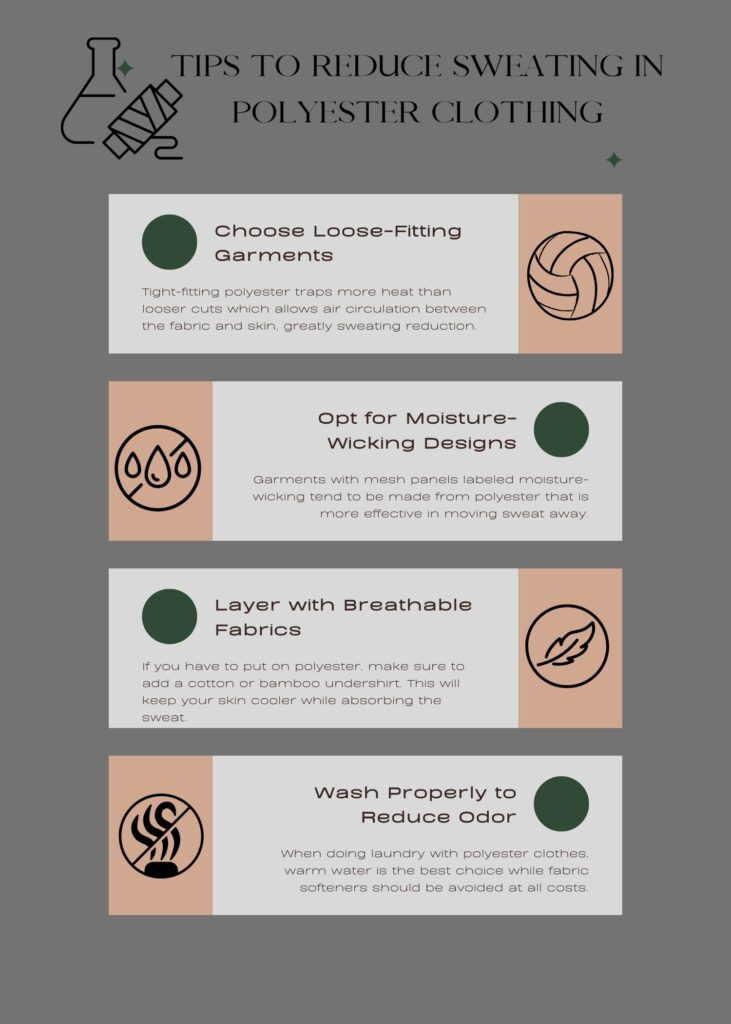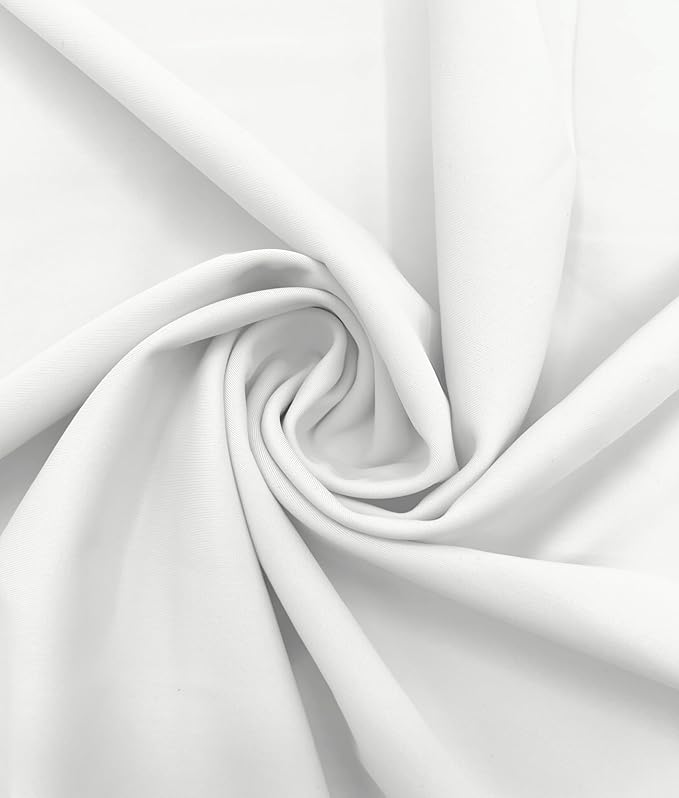Introduction
Polyester is a man made fabric created from the by products of oil. It comes from a chemical reaction between petroleum, air, and water plus coal. The end product is strong and lightweight polyester material used all around the globe. Does polyester make you sweat?
You can find polyester commonly in athletic wear, casual clothes, bedsheet fabrics, and also as padding in furniture. It is easy to get dirt cheap as well as not easily spoiled, for sure; it’s very popular. But many people ask this question: Does polyester increase sweat secretion more than other types of fabrics?
This article answers that question thoroughly. We will put it against self-containing materials, look at the research done on it, and provide advice on how best to put it on. So let’s reveal all secrets about polyester and sweating!
How Polyester Affects Sweating

Breathability: Polyester Traps Heat More Easily
Breathability is definitely one of polyester’s weaknesses. Compared to linen or cotton, polyester has a more difficult time allowing air to circulate. The non-porous and tightly woven fibres of the material mean they trap heat inside garments.
The suffocated airflow results in overheating, which forces sweating to cool down cushions of the body. This is especially tedious during physical activities or hot days.
That question, ”Does polyester make you sweat?” Well, roughly most of it due to poor ventilation somewhere along the line and faulty construction. Ventilation leads to yes.
Moisture-Wicking Claims: Marketing vs. Reality
A lot of clothing made from polyester has “moisture-wicking” written on the tag. This means that the fabric is designed to move your perspiration away from your body. It’s supposed to keep you dry.
But it turns out that not every type of polyester is good at moisture wicking. Inexpensive polyester doesn’t have the appropriate technology for true moisture transport. It doesn’t absorb perspiration; rather, it may just distribute it over the material surface.
So although some high-quality mixtures do minimize sweat buildup, wearing regular polyesters could make things worse.
Heat Retention: Why You May Feel Hotter
Polyester, like other synthetic fibers, keeps heat more than natural fabric. That means your body has to put in extra work to control temperature. This effort leads to even more sweating.
Wearing polyester during summer or working out can be super sweaty. It’s lightweight, but its insulation traps heat, which leads you to overheat more quickly than other clothing.
Polyester vs. Natural Fabrics: Which One Makes You Sweat More?
Natural fabrics such as cotton, linen, bamboo and wool possess the added feature of being more breathable. Their loose weave as well as their porous fibres allow for adequate air circulation. This enables sweat to evaporate on its own, which reduces the amount your body needs to produce.
Cotton: Soft but Soaks Easily
Everyone knows that cotton is soft, but it has two major disadvantages: it gets soaked quickly and does not dry fast enough and becomes heavy. Though cotton may not make you sweat while wearing it, it does not help manage moisture either.
Linen and Bamboo: Great for Hot Weather
Linen is one of the most breathable fabrics and works great for summer. Bamboo is both breathable and moisture-wicking. Additionally, it has some antimicrobial properties which help with odour.
Verdict
With natural fabrics like polyester that traps heat, sweats a lot or lives in warmer climates, these are a much better choice.
Does Polyester Cause Body Odour?
Sure, polyester can cause body odour. As different from cotton or merino wool, it does not absorb sweat. Rather, it permits sweat to pool on top where bacteria flourish. These microorganisms then decompose proteins in sweat, causing bad odours.
Why Polyester Holds Odor Longer
Polyester takes hold of oily waste because of its synthetic composition. Such residues do not always get removed during regular washing. These polyester fabrics then tend to emit stale odours that become stronger after every use.
Better Options for Odor Control
Some fabrics, such as merino wool, resist bacteria and odours naturally. Additionally, cotton tends to smell less since it absorbs moisture, which stops bacteria from growing.
As a result, polyester might not be the right choice if you sweat profusely and are concerned about body odor.
When Is Polyester Good for Sweating?
Note that not all kinds of polyester are terrible. Actually, some advanced blended polyesters perform much better when it comes to dealing with sweat compared to synthetic and natural fibres.
Athletic Wear with Moisture-Wicking Technology
If made right, polyester can get rid of sweat pretty well. Different brands have specific weaves and finishes that take the perspiration to the fabric’s surface. This keeps athletes dry during difficult workouts.
Quick-Drying Benefits
Polyester dries quicker than cotton, which makes it useful for runners and hikers or even during gym sessions.
Does polyester make you sweaty? Sometimes yes, but other fabrics designed for exercise do a better job than polyester shirts do.
Tips to Reduce Sweating in Polyester Clothing

Choose Loose-Fitting Garments
Tight-fitting polyester traps more heat than looser cuts, which allows air circulation between the fabric and skin, greatly reducing sweating.
Opt for Moisture-Wicking Designs
Garments with mesh panels labelled moisture-wicking tend to be made from polyester that is more effective in moving sweat away.
Layer with Breathable Fabrics
If you have to put on polyester, make sure to add a cotton or bamboo undershirt. This will keep your skin cooler while absorbing the sweat.
Wash Properly to Reduce Odor
When doing laundry with polyester clothes, warm water is the best choice, while fabric softeners should be avoided at all costs. These can clog the fibres, which reduces their wicking ability and moisture removal efficiency. Moreover, adding vinegar can help remove difficult smells.
Common Myths About Polyester and Sweating
Let’s debunk some myths about sweating and polyester:
Myth: All Polyester Makes You Sweat Excessively
That’s incorrect. Higher-grade polyester designed for sportswear often keeps you drier than cotton. The finishing techniques used on the fabric as well as its structure make a huge difference.
Myth: Polyester Isq3 Always Uncomfortable
Polyester has been improved greatly over the years, with many newer styles being soft, stretchable, and breathable. While inexpensive polyester can be hot or itchy to wear, premium blends can be quite comfy.
Myth: Natural Fabrics Are Always Better
Not always! While certain fabrics, such as cotton, are breathable, they can feel heavy when wet. Unlike polyester, engineered fabrics do work better during exercise or in high-sweat situations.
Scientific Studies & Expert Opinions on Polyester and Sweat
A number of studies have been done looking at how different fabrics impact sweat production and overall comfort.
Research on Breathability and Moisture Management
A 2014 research study published in the Journal of Textile Science and Engineering stated that polyester traps more heat than linen or cotton. An additional study conducted by Applied Ergonomics showed how synthetic fabrics increase perspiration in warmer conditions.
Experts Weigh In
Additional studies conducted by the same journal showed that gaining cooler temperatures while wearing cotton or linen fabric helps decrease excessive sweating.
Best Alternatives to Polyester for Sweat-Prone People
If you sweat a lot, these might work better for you:
Cotton: Comfortable but Moisture-Absorbing
Although comfy for everyday outfits, cotton is not suitable for physical activities because it absorbs perspiration and takes time to dry.
Linen: Excellent for Summer
Linen is excellent for warm climatic regions, as it is light in weight and very breathable. Unlike cotton, linen dries faster and keeps you cool as well.
Bamboo: Soft, Antimicrobial, and Breathable
Bamboo fabric is great for everyday wear and physical activities, as it is highly breathable and resists bacteria.
Merino Wool: Natural Moisture-Wicking
Merino wool is light and soft and does not trap odour. Its ability to regulate temperature makes it ideal for both warm and cold seasons.
Tencel: Sustainable and Cool
Tencel feels cool to the touch, absorbs moisture better than cotton, and releases it quickly, making Tencel eco-friendly materials even more impressive.
Tencel: Sustainable and Cool
Tencel feels cool to the touch, absorbs moisture better than cotton, and releases it quickly, making Tencel eco friendly materials even more impressive.
Conclusion
So, does polyester make you sweat more than other fabrics? Yes, especially when it is made from cheap, tightly woven polyester. These types of polyesters lack breathability and heat-trapping fabric, which often increases perspiration.
Different kinds of polyesters serve different purposes. Blends made for specific activities, such as attention to athletic apparel with added moisture-wicking features, minimise excessive sweating and discomfort while wearing polyester clothing. The essential piece is using a specific type of polyester suited for your activity or surroundings.
FAQS
Yes, polyester is less breathable than cotton. It traps heat and limits airflow, which can cause your body to sweat more to stay cool.
Polyester traps body heat due to its tight weave and synthetic fibers. This prevents sweat from evaporating, leading to a sticky and uncomfortable feeling.
Moisture-wicking polyester is designed to pull sweat away from your skin. High-quality athletic versions can reduce sweat buildup, but cheap polyester may not offer the same benefits.
Yes, it can. Polyester doesn’t absorb sweat well, so bacteria remain on the surface and break down sweat, causing unpleasant odor.


